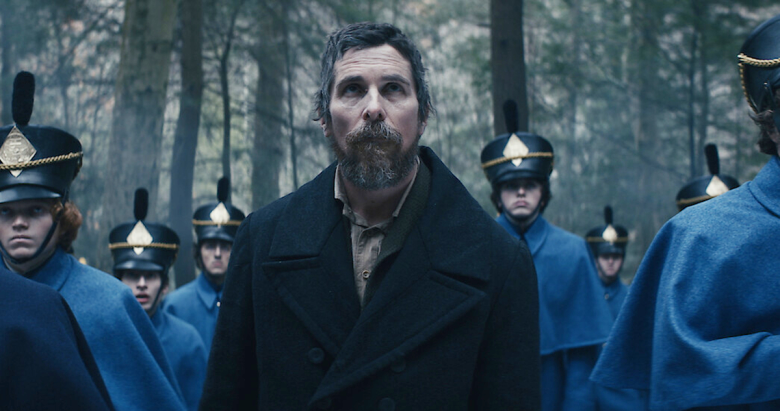
The Pale Blue Eye Synopsis: Veteran detective Augustus Landor (Christian Bales) investigates a series of grisly murders with the help of a young cadet who will eventually become the world-famous author Edgar Allan Poe (Harry Melling). Based on a 2003 novel by author Louis Bayard.
Grief-ridden detective Augustus Landor is hired to investigate a string of deaths discovered within Westpoint Military Academy. While piecing together the puzzle, Augustus collaborates with Edgar Allan Poe during his youthful days as a military cadet in the murder mystery, The Pale Blue Eye.
Poe's influences as a literary savant embedded in the haunting allures of the macabre are well-recognized. Along with several cinematic adaptations of his work, Poe remains a significant influence on many visionaries who continue to shape the horror genre.
A fictional reimagining of Poe's youth through the prism of a deadly crusade for enigmatic truths seems like a worthwhile undertaking for writer/director Scott Cooper. Unfortunately, Cooper's adaptation of an acclaimed novel descends into a dull and oppressively self-serious exercise in whodunit contrivances.
I've admittedly always been a fan of Cooper's distinctive imprint behind the camera. Crazy Heart and Out of the Furnace operate as gritty and piercingly authentic character studies, while 2021's overlooked horror feature Antlers saw Cooper merge his dreary worldview within the confines of horror's visceral nightmares.
In some ways, The Pale Blue Eye is a fitting extension of his sensibilities. Cooper and Cinematographer Masanobu Takayanagi evoke a compelling sense of atmosphere through their gothic visual profile. Every rustic exterior is dressed in thick clouds of ominous haze as Landor and Poe traverse through the mucky muck of a snowy landscape. The interiors are equally expressive, with the dim flickers of candlelight and luring shadows defining an unnerving sense of place.
The Pale Blue Eyes may look the part of a taut mystery, but its narrative drastically underachieves in its pursuits. Cooper intends for his film to amplify meaningful sentiments through our protagonist's conjoined existence as prisoners of grief and despair. Yet, in execution, Cooper struggles to imbue necessary nuance. Everything about the characters and their struggles feels incredibly surface-level - so much so that even intense performance work from a brooding Christian Bale and a dedicated Harry Melling can extract purpose from the film's central subjects. I can see where Cooper tries to capture the aching soul and pained emotions spotlighted in Poe's literary work with Blue Eye; It just doesn't come together onscreen.
The central mystery at the heart of The Pale Blue Eye is equally underwhelming. What may have worked as an exhilarating narrative yarn on paper is lost in translation by Cooper's screenplay. Every uncovered clue and last-second revelation can be telegraphed from a mile away, and while a third-act reveal does add some intriguing thematic connotations, it ultimately lands as a desperate attempt to inject some excitement into flatlining material. Without an engaging narrative hook, the film tepidly meanders throughout its 130-minute runtime until its tedious puzzle pieces sloppily come together.
The Pale Blue Eye is competent and aesthetically pleasing, yet neither element imbues interest in a lifeless murder mystery. Nevertheless, I am still a huge fan of Cooper's perspective behind the camera and look forward to seeing what he conjures next.
The Pale Blue Eye is now playing on Netflix.
